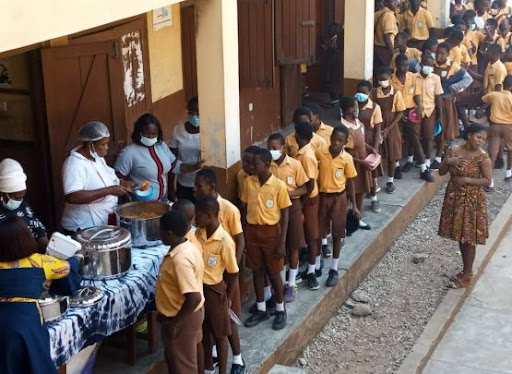The Ghana School Feeding Programme (GSFP) is an initiative of the Comprehensive Africa Agricultural Development Programme (CAADP) Pillar 3, which seeks to enhance food security and reduce hunger in line with the United Nations (UN) Sustainable Development Goals (SDGs) on hunger, poverty and malnutrition.
Since 2005, the Ghana School Feeding Programme has been one of Ghana’s most critical social intervention strategies for improving educational outcomes and reducing poverty. The GSFP drew inspiration from the MDGs and is in tune with the SDGs in addressing the issue of hunger, increasing enrollment in schools, and empowering local agricultural producers. Although the program has had significant achievements, it still struggles with many challenges that place its sustainability and effectiveness at risk.
Overview of the Ghana School Feeding Program
The fundamental goal of the GSFP is to give pupils in public primary schools and kindergartens free, wholesome meals. In addition to fighting hunger, this program encourages parents to take their kids to school. Additionally, by purchasing food from smallholder farmers, the initiative incorporates local agriculture and promotes economic growth in rural areas within the country.
Between 2005 and 2023, GSFP expanded significantly, reaching over 3.6 million schoolchildren across all 261 districts in Ghana. Studies have demonstrated that the initiative has positively impacted school enrollment and retention rates, particularly in underserved communities. However, despite these achievements, the program faces persistent challenges, including inadequate funding, operational inefficiencies, and food quality and delivery issues.
Challenges Facing the GSFP
- Inadequate Funding
Frequent financial shortages have weakened the GSFP’s capacity to deliver reliable, high-quality meals. The program is susceptible to financial limitations because it depends on government funding and donations. According to a SEND Ghana (2021) study, meal plans are regularly disrupted by late payments to caterers, which forces many to operate at a loss or stop providing services entirely. Caterers occasionally turn to borrowing, reducing their sustainability and profit margins.
- Food Quality and Safety Concerns
The nutritional quality of meals provided under the GSFP has been a major point of contention. Reports of substandard or insufficient meals have been common, with caterers often citing rising food costs and delayed payments as reasons for cutting corners. This issue undermines the program’s goal of addressing child malnutrition, as meals provided do not always meet recommended dietary standards.
- Corruption and Mismanagement
Over the years, there have been corruption and operational inefficiencies within the program. Among other problems that sparked concerns about accountability and transparency were exaggerated beneficiary counts, anomalies in the supply acquisition process, and partiality in the choice of caterers. For example, Ghana’s Public Procurement Authority discovered inconsistencies in food supply contracts issued in 2020, which inflated costs and jeopardized service delivery.
- Overdependence on External Funding
Despite the substantial assistance from donors, the GSFP’s excessive dependence on outside finance raises questions about sustainability. The Netherlands Development Organization and the World Food Programme are two examples of international donors who have been instrumental in funding the initiative. However, shifts in donor priorities and/or economic downturns could threaten the program’s continuation.
- Impact of Inflation and Rising Food Prices
Over the past several years, Ghana’s economy has been plagued by large-scale inflation and concurrent currency depreciation. Such macroeconomic issues reflect sharp increases in food prices, making purchasing ingredients within a caterer’s allocated budget inefficient. As a result, meal quality and quantity are most often affected, making the program’s overall results below par.
BudgIT Ghana’s Commitment to Ensuring Accountability in the GSFP
BudgIT Ghana is committed to promoting transparency, accountability, and efficient spending in the Ghana School Feeding Program (GSFP). We advocate for improved funding, timely disbursements, and stronger oversight to curb inefficiencies. Through our Tracka platform, we actively monitor the implementation of projects, engage communities, and report discrepancies in real time. We aim to ensure every child benefits from a well-funded and sustainable GSFP. We also seek partnerships with initiatives that promote social good, transparency, and accountability to drive lasting impact.
Proposed Solutions and Recommendations
In a strife to address these challenges, a multi-faceted approach is needed:
- Enhanced Funding Mechanisms: The government should allocate a fixed percentage of the national budget to the GSFP, ensuring reliable and sufficient funding. Additionally, exploring partnerships with private sector stakeholders could help diversify funding sources.
- Strengthened Monitoring and Evaluation: Improved oversight mechanisms, including digital tracking of funds and beneficiaries, can enhance accountability and reduce corruption. The program should also empower local communities to actively monitor food quality and caterer performance.
- Capacity Building for Caterers: The government should establish mechanisms to provide training on meal planning and budget management, as this can help caterers deliver cost-effective, nutritious meals despite rising food prices.
- Local Agriculture Integration: Strengthening the link between the GSFP and local farmers can create a win-win situation. Investment in agricultural infrastructure and extension services will ensure that farmers produce quality food to meet the program’s demands.
Conclusion
The Ghana School Feeding Program remains a vital intervention for improving education and nutrition in Ghana. However, its challenges, ranging from funding inadequacies to operational inefficiencies, require urgent attention. By addressing these issues through sustainable policies and stakeholder collaboration, Ghana can ensure the GSFP fulfils its potential as an educational and social transformation driver.
